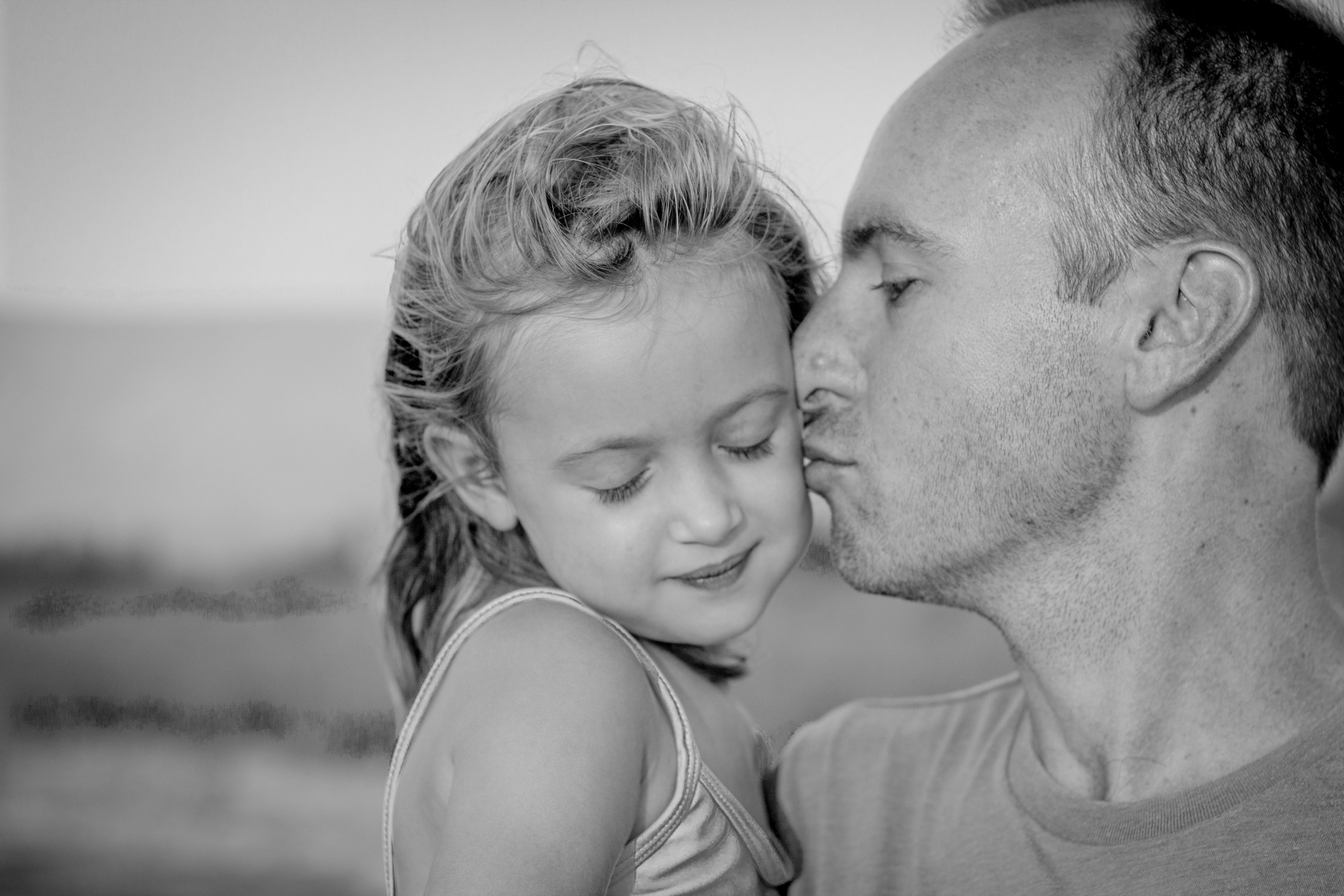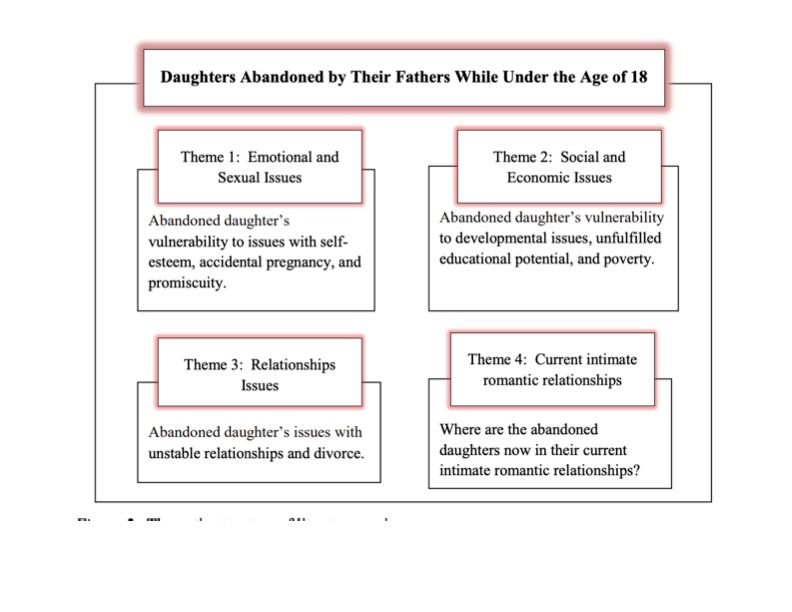How Fatherhood Abandonment Impacts Daughters In Adulthood
You are not doomed to a life of struggle if you did not grow up in a home with a traditional “father.”
You’ll read evidence in this article that growing up without a father can have a long-lasting, negative impact on your life. And I know plenty of adults and children who are thriving and grew up in homes with grandparents, a single mom, or two parents of the same gender. You are not doomed to a life of struggle if you did not grow up in a home with a traditional “father.”
And for some of you, your father’s absence may be the reason behind your struggle. I want to be clear: this is a potential reason for your struggle in adulthood. It is not the only reason. There are also many possible types of fatherhood abandonment, physical and emotional; each comes with unique challenges and circumstances.
If this topic resonates with you, I hope you’ll read this article and find a way to exhale and say: it was not my fault. It makes sense that I want to be close to my father. It makes sense that I struggle with this wound. I am allowed to explore this and heal from it.
Fathers can be absent in various ways, both physically and emotionally. Many of the reasons fathers are missing from their daughters' lives are direct consequences of our incorrect preconceived notions about fathers, society's impact on the family, and the role fathers are expected to fill.

From a young age, women are told they are “wired” to care for children. They’re led to believe the female brain is more sensitive, responsive, and attuned to children. Researcher Linda Nielsen asks, “Consider the impact this belief might have on new parents whose baby girl has just arrived. What might the long-range implications be for this father-daughter relationship if either parent believes that the mother’s brain is somehow “superior” to the father’s when it comes to raising their daughter?” This “wiring” has been debunked several times. Through advanced imaging, we can see which areas of the brain become more activated when parents interact or hear their babies. When parents hear their baby cry or look at pictures of their baby, similar brain areas become more activated in mothers and fathers. It’s not a different “instinct” or “wiring” that tends to make fathers less likely to care for their children; it’s faulty societal messaging and conditioning.
Fathers also started moving out of the home in the mid-nineteenth century for economic reasons. They spent less time in the role of “parent” and were seen solely as financial providers for the family. Because of this shift, fathers were no longer an active and present dominant influence in the family and instead became a physically absent and occasionally dominant influence. Fathers no longer had routine opportunities to parent actively, children spent less time with their fathers, and many suffered.
Many of us also grew up hearing that women are more empathetic, nurturing, and communicative than males. You expect your mother to have the skills to comfort you and help you through relationships. If daughters are told that their fathers do not have the capacity for empathy, understanding, or comfort, why would they go to them with any emotional issues? How would they ever feel comfortable bringing up anything remotely sensitive or emotional? And if fathers believe they cannot handle these issues, they will emotionally abandon their daughters without even realizing they’re doing so. The abandonment is simply because “they can’t do that stuff,” and mothers are naturally more skilled.
Fatherhood abandonment is poorly defined in the literature, and many different types exist. I want to offer you a few examples of abandonment, and you can decide which ones apply best to your life:
- Physical Abandonment: This may happen through divorce, death, absences because of employment or military service, addictions, incarceration, or chronic physical or mental illness. Fatherhood.gov defines an “absent father” as a father who, “in the process of leaving the family, does not offer explanations to their children about the reasons for their departure. The other dominant attribute of this type of father is that he does not stay in contact with his children or, again, offers reasons for his continuing disconnection from them. The children thus abandoned feel their fathers are mysteriously, enigmatically, cryptically, or secretively absent.”
- Emotional Abandonment occurs when a father seems to stop caring about and loving you. The parent fails to listen to the child’s emotional experience, does not prioritize their emotional needs, and may make the child feel invisible or like an inconvenience.
- Abandonment Through Death: A child may feel abandoned by a parent after their passing, even if the death was accidental or not the parent’s fault. They are missing out on the protection and presence of a parent. Young children often cannot comprehend why the abandonment happened and are just reacting to the absence.
- The legal definition of childhood abandonment (Florida): “Abandoned” or “abandonment” means a situation in which the parent or legal custodian of a child or, in the absence of a parent or legal custodian, the caregiver, while being able, makes no provision for the child’s support and has failed to establish or maintain a substantial and positive relationship with the child. For purposes of this subsection, “establish or maintain a substantial and positive relationship” includes, but is not limited to, frequent and regular contact with the child through frequent and regular visitation or frequent and regular communication to or with the child and the exercise of parental rights and responsibilities. Marginal efforts and incidental or token visits or communications are insufficient to establish or maintain a substantial and positive relationship with a child.”
How Fatherhood Abandmonet Impacts Daughters
I found this chart in a dissertation. It illustrates the adverse impact childhood fatherhood abandonment can have on adult daughters.

- A study of 1,409 adolescents, 851 female, showed a significant statistical relationship between the father's absence and lower self-esteem (Hendricks et al., 2005). The severity can depend upon the gender and the age of the subject at the time of father abandonment (Luo et al., 2011).
- 25% percent of daughters whose mother and father divorce go through an entire year without spending time with their father (Nielsen, 2011).
- Across several studies, daughters experienced adverse outcomes after father abandonment, including accidental pregnancy (Quigley, 2003), social and economic problems for the abandoned daughters, unfulfilled educational potential (Krohn & Bogan, 2001), poverty (Haywood, 1995), developmental deficits (La Guardia, Nelson, & Lertora, 2014), and relationship issues that lead to unstable relationships and divorce (Comings et al., 2002).
I have identified some significant limitations within the research on father-daughter abandonment. I also want to leave you with a few things to consider:
- Very few studies track daughters through adulthood.
- We do not know what would happen if some of the fathers stayed in the home. It could be argued that an abusive father in the house is worse than an abusive father who abandons their child. It’s impossible to predict the outcomes of each situation and which result is worse.
- There is a big focus within the literature on girls becoming more “promiscuous” when fathers abandon them. This places too much responsibility on the young girl and leaves the men involved out of the equation. I’d like to see this language change.
- Researchers Biblarz and Stacey summarized the evidence from thirty previous studies comparing lesbian and heterosexual parent couples in different ways. The studies reviewed found no difference between outcomes for the children of lesbian and heterosexual couples. In the few cases where differences were found, it was the children of the lesbian couples who were better off. “For example, some studies found higher levels of attachment and lower levels of behavior problems among children of lesbian than heterosexual couples, though this may be due partly to the fact that the lesbian couples studied tend to be wealthier and more educated than the general population.” (Ambridge 2022)
- Children who grow up without fathers may not be worse off because they lack a father. It may be because these single-parent families tend to have “lower average incomes, fewer years of education, and higher levels of depression. If we disregard these differences, yes, children from single-parent families do show higher levels of behavior problems and lower test scores. However, if differences are controlled, any disadvantages shown by children of single-parent families become small to non-existent. Particularly important is the extent to which the child’s home environment includes emotional support and cognitive stimulation. Of course, this is much more difficult to do “hen only one parent is around. But when single parents do manage to provide this type of environment, it just about wipes out any disadvantages for single- versus two-parent families.” (Ambridge 2022)
- Daughters who are abandoned by their fathers are also often forced to live in homes with step-fathers who are physically, emotionally, or sexually abusive. "If their parents find new partners, children are 40 times more likely than those who live with biological parents to be sexually or physically abused." According to a Missouri-based study of children living in homes with unrelated adults, children are “nearly 50 times as likely to die of inflicted injuries as children living with two biological parents.”
- Some continue to promote that mothers have a more significant influence and impact on their children, despite this being refuted by four of the most prominent scholars in child development. There is insufficient evidence to suggest that mothering and fathering are different or that one parent has a more significant impact because of their title. Some mothers are empathetic; some are cruel. Some fathers are loving and affectionate; some are cold and disengaged. Good parenting positively impacts the child, whether mothers or fathers do it. Neglectful/negligent parenting hurts the child, whether the father or the mother.
This Might Be Why Fatherhood Abandonment Hurts So Bad For Daughters
It hurts when someone you love abandons you. It hurts even more when you’re a child who has no idea why they were left. When an important person steps out of a child’s life with an explanation that doesn’t make sense, the child is more likely to blame themselves than the parent.
An abandoned childhood will think and believe:
- “I’m the reason they left.”
- “I should have tried harder to get them to stay.”
- “I am unloveable.”
- “If I were better, they would have stayed.”
- “They left because I was so bad.”
- “It’s my fault.”
These become core beliefs that dictate behavior until we have the resources and skills to challenge them. Because of this, many daughters will spend their lives trying to prove their loveable, trying to get someone to stay, and believing that everything is their fault.
When fathers abandon their daughters in certain ways, they lose someone they believed “should” love them. This is further complicated by how the other person perceives and frames that abandonment. If you have a mother who consistently bashes your father and tells you that “all men are garbage,” you may come to believe it. And, if you lose your father because he was trying to save someone from a burning building, you’ll develop a completely different story about that physical loss as you age.
We’ve set fathers and daughters up for failure in so many ways. So, where should we begin?